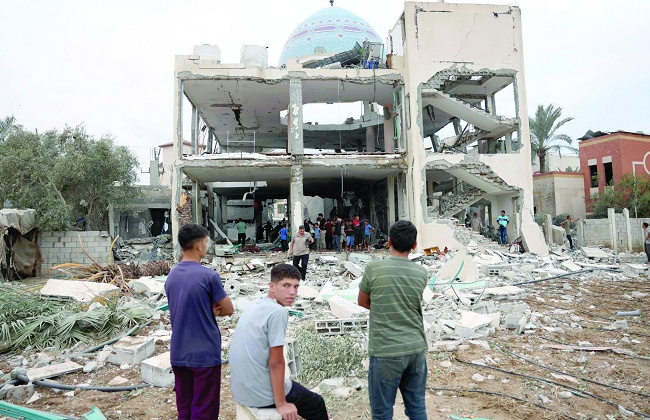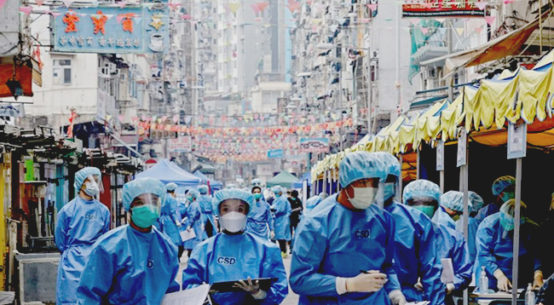
At least 24 people were killed and 93 others wounded early on Sunday morning when Israeli air strikes targeted a mosque and school sheltering displaced people in Gaza, according to Palestinian officials.
Gazan health officials said at least another 20 people had been killed since Saturday night in the north of the Palestinian enclave, after the army sent tanks into areas there for the first time in months, while urging residents to go to what it called safe zones in the south.
The Israeli military said it had conducted “precise strikes on Hamas terrorists” who were operating within command and control centres embedded in Ibn Rushd School and the al-Aqsa Martyrs mosque in the area of Deir al-Balah in central Gaza.
Hamas rejects Israeli accusations it uses civilian facilities such as schools, hospitals and mosques for military purposes.
The strikes on the mosque and the school came as the war between Israel and the Palestinian militant group Hamas approaches its first anniversary, and as Israel has been expanding its actions in Lebanon.
The Hamas-run Gaza government media office said Israel had struck 27 houses, schools and displacement shelters across Gaza in the past 48 hours.
“These crimes take place amid difficult health conditions in Gaza, and where the remaining hospitals are unable to provide good medical and healthcare as the number of injured and patients increase every day,” it said.
The army on Saturday issued new evacuation orders in parts of Nuseirat camp in central Gaza, just north of Deir al-Balah, forcing hundreds of families to leave their houses. The military statement said its forces aimed to operate against Hamas militants who waged attacks from the territory.
Meanwhile, Israeli tanks pushed into the northern Gaza areas of Beit Lahiya and Jabilia overnight, and planes hit several houses, killing at least 20 people, according to doctors.
The Israeli military said its forces had encircled the area Jabilia, the focus of its operations.
In one air strike, 10 people were killed in one house, and five others in another strike on a second home. Residents described it as one of their worst nights in many months.
The Israeli military said its forces were operating in Jabilia, the largest of Gaza’s eight historic refugee camps, to fight Hamas militants, dismantle military infrastructure, and prevent Hamas from regrouping.
“Before the start of the operation, the Air Force attacked dozens of military targets to support the manoeuvring forces, including weapons depots, underground structures, terrorist cells, and additional military structures,” the Israeli military statement said.
“The operation will continue as necessary, with systematic strikes and the radical destruction of terrorist structures in the region,” it added.
It directed residents to head towards humanitarian-designated area in Al-Mawasi in southern Gaza.
Palestinian and UN officials say no place in the enclave is safe including the humanitarian zones where Israeli missiles have hit several times.
“The war is back,” said Raed, 52, from Jabilia, before he and his family left for Gaza City on Sunday.
“Dozens of explosions from air strikes and tank shelling shook the ground and buildings, it felt like the early days of the war,” he said, speaking to journalists using a chat app.
Asked whether they would go to Al-Mawasi as the army requested, he replied: “As if they didn’t kill people displaced in the so-called humanitarian areas? We will not leave northern Gaza.”
The Israeli army has said Hamas militants have exploited the civilian population in humanitarian-designated areas, an allegation Hamas denies.
Also on Sunday, A gunman killed a woman and injured several people at the bus station in the southern Israeli city of Be’er Sheva on Sunday, before being “neutralised” by the police, they said.
It was unclear from the report whether he was arrested or killed.
Police are treating the incident as a terrorist attack.
The perpetrator was a Bedouin with Israeli citizenship, according to military sources.
The Israeli rescue service reported that 10 people were injured and treated at a city hospital.
Beersheba is called the “gateway to the Negev Desert”.

